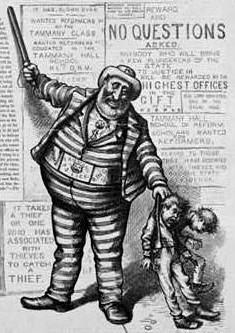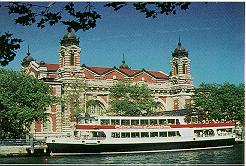Posted by TIMOTHY MCAULIFFE on 09:18:52 12/09/04
Tim McAuliffe (718) 452-8421; fax (718) 221-3915
Someone must have been telling lies about Joseph K., for without having
done anything wrong he was arrested one fine morning. Thus begins Franz
Kafka's classic novel, The Trial. It is a tale of tragic horror, a
nightmare vision of the excesses of modern bureaucracy. O'Hara, a man
whose dilemma resembles that of Joseph K. One morning in 1996 Mr. O'Hara
was arrested and then prosecuted for exercising our most fundamental
right, the right to vote. John O'Hara, an attorney, political activist,
and former candidate, had always been proud that he had never failed to
vote in a single election since he came of the legal age of eighteen. In
1992 he changed his voting address from his own apartment on 61st Street
in Brooklyn to an apartment on 47th Street where he often stayed with his
former girlfriend. In various elections in 1992 and 1993 he voted from the
47th Street address five times. For this alleged crime he was convicted of
seven felony counts of illegal voting and false registration, disbarred as
an attorney, fined twenty thousand dollars, and faced up to twenty eight
years in prison. To this day he does community service, cleaning up
garbage in a Brooklyn Park where he once campaigned for office. Since many
people in the political class maintain multiple residences, one must ask
the question, Why was Mr. O'Hara singled out for such torment? He did not
vote twice in the same day, and he was not charged with voting from a
false residence, but that his ex-girlfriends house was not his
principal and permanent residence. In fact, Mr. O'Hara has lived in the
same neighborhood in Brooklyn his entire life. Indeed, careful research
reveals that the last person to be convicted of illegal voting in New York
was in 1873. The defendant in that case was Susan B. Anthony. The answer
is simple. Mr. O'Hara had long been a fierce and vocal critic of the
Brooklyn political machine and District Attorney Charles Hynes. It took
the prosecutor three trials and four appeals ending in a split decision to
get the verdict he wanted. Part of the problem was that New York's arcane
election laws are unclear in their definition of residency. Judge Albert
Rosenblatt of the Court of Appeals wrote in his stern dissent against the
conviction of Mr. O'Hara that the case was politically charged, and that
if issues of residency are to be resolved in the criminal arena, with the
possibility of conviction and incarceration, we should ensure that the
definition of residence is plainly fixed and easily understood. He noted
that the same court had found an Albany lawyer, John Holt-Harris, to be in
compliance with residency laws in a civil proceeding, when he ran for a
city judgeship from an address where he recalled eating and sleeping only
once in seven years. Although Mr. O'Hara had never been accused of any
crime prior to his arrest, he had been a frequent candidate for office
battling the political establishment. In reality, Mr. O'Hara's true crime
was that he ran for office and lost. It is no small coincidence that the
morning of his arrest he was on his way to federal court to testify
against the party machine for election fraud. As the usually reserved New
York Law Journal noted in a recent article about the case, is this what
has become of our electoral process the winners take office and the
losers go to jail or is this just an unheard of criminal prosecution
against a political activist who refused to bow to the crown. In the
current political climate, everyone often risk ridicule when they make
political statements, but we are citizens and this is a serious situation
when a country starts locking people up for voting. At a time when our
leaders are waxing patriotic, perhaps we should first ensure that our
citizens have the freedom to exercise their basic rights under the law.
Sincerely,
TIMOTHY MCAULIFFE
Follow Ups:





